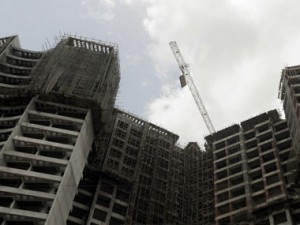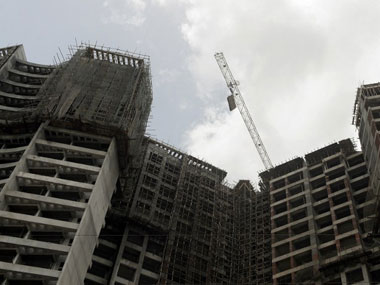
(AFP Photo)
By Ahmed Samir
The real estate market has been struggling to collect customer payments and periodic premiums since the 25 January revolution, negatively impacting on companies’ liquidity rates.
The problem worsened during 2012. A further increase in the liquidity rate has taken place this year.
“750 of [my] clients were unable to pay the full amount owed, so they were granted refunds, and returned housing units in various projects,” said Chairman of Roiaa Real Estate Investment Abdul Ghani El-Gamal.
The problem comes amid the turbulent economic situation, high unemployment rates, and the lack of an economic and political plan from Egypt’s government.
El-Gamal pointed out that 80% of the real estate units returned were in tourist areas, with the remaining 20% in residential areas.
He explained that the majority of those who were unable to make their payments were exposed to “terrible economic conditions” following the revolution, which even forced some to immigrate.
“The company set a schedule for customers to pay their installments during a period of 6 months up to a year, depending on the value of the project or the value of the residential unit to the client,” he added.
The cancellations and refunds have severely affected Roiaa’s cash flow.
El-Gamal also said that low cash flow levels have led the company to postpone a number of its projects, specifically those related to tourism, for two years due to lack of financial liquidity.
Projects such as “Porto Mayorka” and “Roiaa Resort” were initially set to launch at the end of 2012, but are currently planned to be launched this year.
“Some of our clients did not take into consideration the weak economic performance of many real estate and development companies,” El-Gamal said. “So they tried to fine us because the residential units were not delivered on time due to the lack of financial liquidity needed to complete the current projects.”
El-Gamal made clear that the company did not preapprove fines for clients who fail to pay, in order to maintain the company’s reputation in the market.
He also stated that the company “does not owe the banking sector any financial dues based on its purchase of land through individual funding”.
Chairperson Mohamed Roushdy of Al Wataniya Real Estate and Development faces a similar situation at his own company.
“55% of our clients were unable to pay their installments, which is why we had to extend the deadlines for payments,” he said.
Al Wataniya’s ongoing projects were halted until greater financial liquidity is available.
Chairman of Cordoba Real Estate and Investment Taha Abdel Latif estimated that two to three percent of customers have missed one or more payments.
This is due to the installment payment system “which is suitable for everyone given the current unstable economic situation”.
“We did not impose any fines on our regular customers who were unable to pay in order to maintain strong ties with them,” said Abdel Latif, citing Egypt’s economic struggles as the reason for falling liquidity.
Abdel Latif stated that Cordoba “had not received requests so far from any of its clients to receive refunds on payments already made”.



